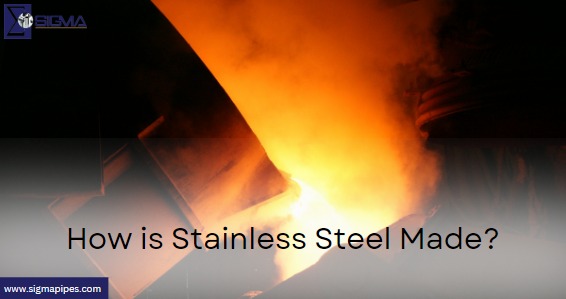Stainless steel is an incredibly versatile alloy with a wide range of applications, making it highly popular in various industries. Also known as SS steel, it finds use in numerous products. In this blog, Sigma Pipes will explore what SS is and its manufacturing process. Join us to delve into the world of SS and its production.
A sneak peek into Stainless Steel Pipe
SS, an alloy primarily composed of iron, is created by combining multiple metals and non-metals. What sets SS apart from conventional steel is its exceptional resistance to corrosion. This attribute stems from the presence of a protective layer that shields the material from rust and deterioration. As a result, SS exhibits a lustrous surface that remains untarnished over time, earning it the “stainless” moniker. Unlike regular iron or steel, SS boasts an inherent ability to withstand environmental elements that would typically cause corrosion. This is due to the alloy’s composition, which includes chromium, nickel, and other elements. The combination of these components forms a chromium oxide layer on the surface of the steel, effectively acting as a barrier against rust formation and maintaining its shiny appearance.
The Making of SS
SS is created by combining a mixture of different metals and nonmetals. The process of making SS involves incorporating elements like iron, nickel, chromium, carbon, and molybdenum. The specific ratios of these elements vary, resulting in different types of stainless steel made pipes such as SS310, SS410, SS304, SS316, etc. The production of SS involves melting and blending various substances to create the SS alloy. The use of different components leads to the creation of diverse styles and variations of SS.
Applications of SS
Stainless steel made pipes find extensive applications across various industries, from aerospace to the food sector, owing to its wide-ranging benefits. Here are some notable applications of SS:
- Automotive Industry: SS was first introduced in the automotive industry by Ford in the 1930s. Since then, it has been utilized in manufacturing various vehicle components, including exhaust systems, trims, grills, and more.
- Transportation and Shipping: Due to its corrosion resistance, SS is commonly used in the transport of chemicals, liquids, and food products. It is favored for applications such as shipping containers, road tankers, and refuse vehicles.
- Low-Maintenance Solutions: The inherent low-maintenance nature of SS makes it popular in numerous industries. It offers cost-effective and sustainable solutions due to its durability and ease of cleaning.
- Medical Equipment: SS plays a crucial role in the medical field, finding applications in surgical tools, operation tables, kidney dishes, MRI scanners, and steam sterilizers. Its hygienic properties and resistance to corrosion make it an ideal choice for medical equipment.
- Aerospace Industry: SS is widely used in the aerospace industry due to its strength, heat resistance, and corrosion resistance. It finds applications in aircraft components, structural parts, engine components, and exhaust systems.
- Food Processing and Hospitality: SS is a staple in the food industry due to its hygienic properties and ease of cleaning. It is used to manufacture kitchen equipment, food processing machinery, countertops, sinks, refrigeration units, and storage tanks. In the hospitality sector, SS is used for bar counters, serving carts, and hotel fixtures.
- Construction and Architecture: SS’s durability and aesthetic appeal make it popular in the construction and architectural fields. It is used for building facades, handrails, balustrades, staircases, elevator interiors, and exterior cladding. SS’s resistance to corrosion makes it suitable for both indoor and outdoor applications.
- Energy and Power Generation: SS is utilized in energy and power generation industries due to its high-temperature strength and corrosion resistance. It is used in turbine components, nuclear power plants, solar panels, and oil and gas refineries.
- Marine and Offshore Structures: SS’s resistance to corrosion in harsh marine environments makes it an ideal choice for shipbuilding and offshore structures.
Get a decent quote from us at https://sigmapipes.com/.


